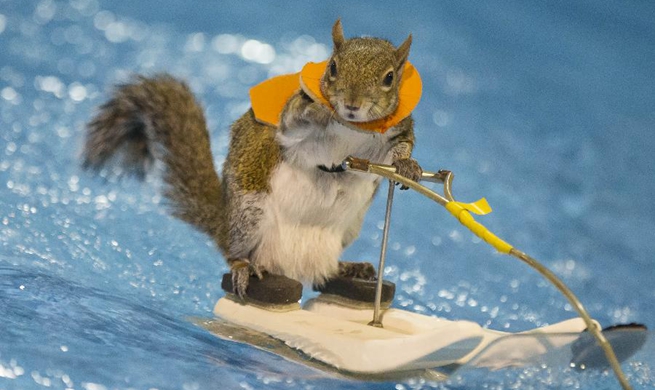SAN FRANCISCO, Jan. 14 (Xinhua) -- A group of British scientists have found that regular surfers are three times more likely to harbor antibiotic-resistant bacteria than those who stick to dry land.
Researchers of the University of Exeter conducted a study among 300 people, most of whom are regular surfers, to see whether they are more vulnerable to bacteria in sea water, including the antibiotic-resistant Escherichia coli (E. coli), which can cause diarrhea, urinary tract infections, respiratory illness and other illnesses because these surfers swallow 10 times more sea water than sea swimmers.
Their findings, which were published Sunday in the journal Environment International, discovered that 9 percent of surfers, over three times more than non-surfers, had the antibiotic-resistant E. coli bacteria present in their guts.
Such a result indicated that the bacteria would continue to grow in the body of the surfers even if they were first treated with cefotaxime, a commonly used and clinically important antibiotic.
Cefotaxime has previously been prescribed to kill off these bacteria.
The researchers also found that regular surfers were four times more likely to have the bacteria that contain mobile genes capable of making bacteria resistant to the antibiotic.
Anne Leonard, who led the research, said the study "is the first of its kind to identify an association between surfing and gut colonization by antibiotic resistant bacteria."
The researchers estimated that more than 2.5 million water sports sessions took place in England and Wales in 2015, which involved ingestion of E. coli bacteria.
Recently, the United Nations Environment Assembly has conceded that the spread of antibiotic resistance in the environment is one of the world's greatest emerging environmental concerns.
The World Health Organization also warned that the world is facing a possibility in which antibiotics are no longer effective to kill simple, and previously treatable, bacterial infections.
In such a case, infections like pneumonia, tuberculosis, blood poisoning, gonorrhoea, and food and waterborne diseases could be fatal, it said.
A British government report even said that antimicrobial resistant infections could kill one person every three seconds by 2050 if current trends continue unabated.
The researchers hope their study will help policy-makers and other stake holders, such as beach and water management bodies, make evidence-based decisions to improve water quality for the benefit of public health.

















